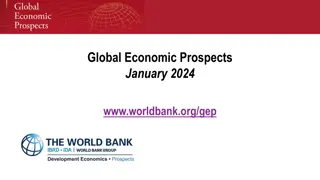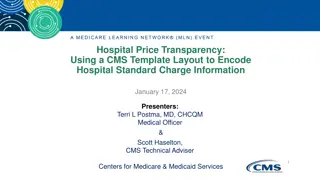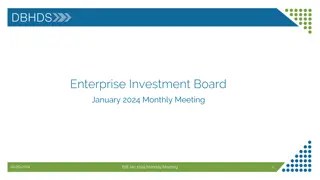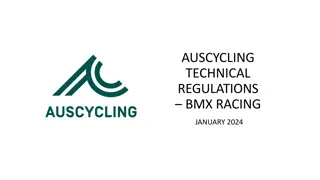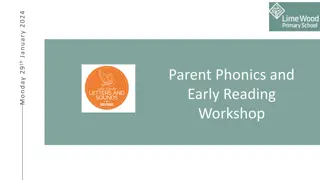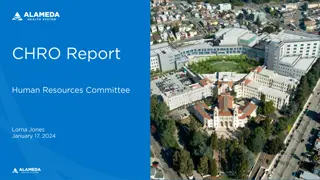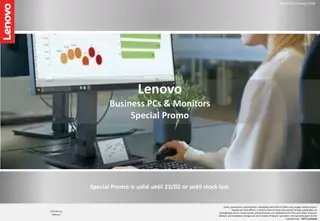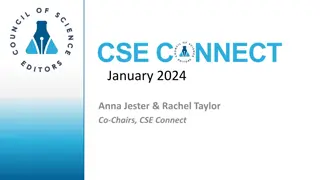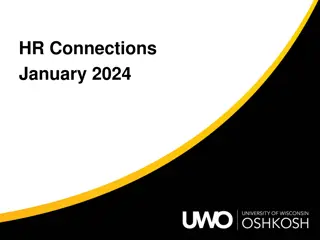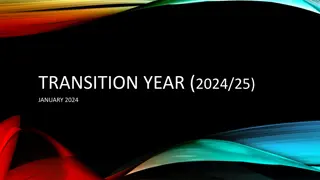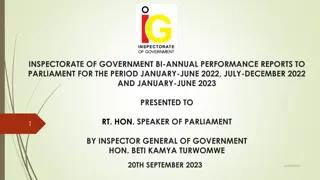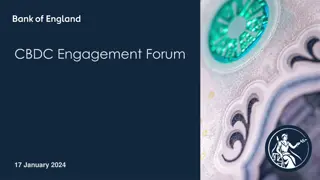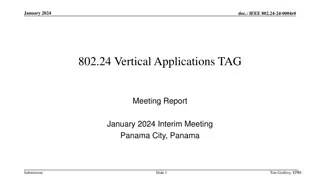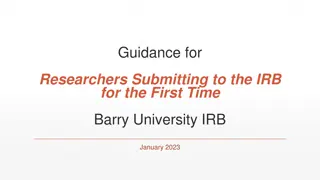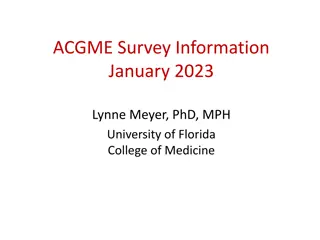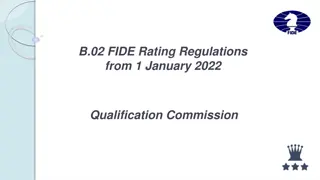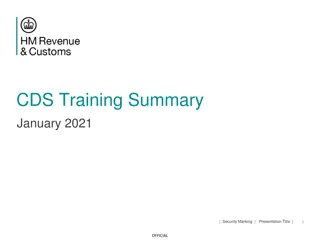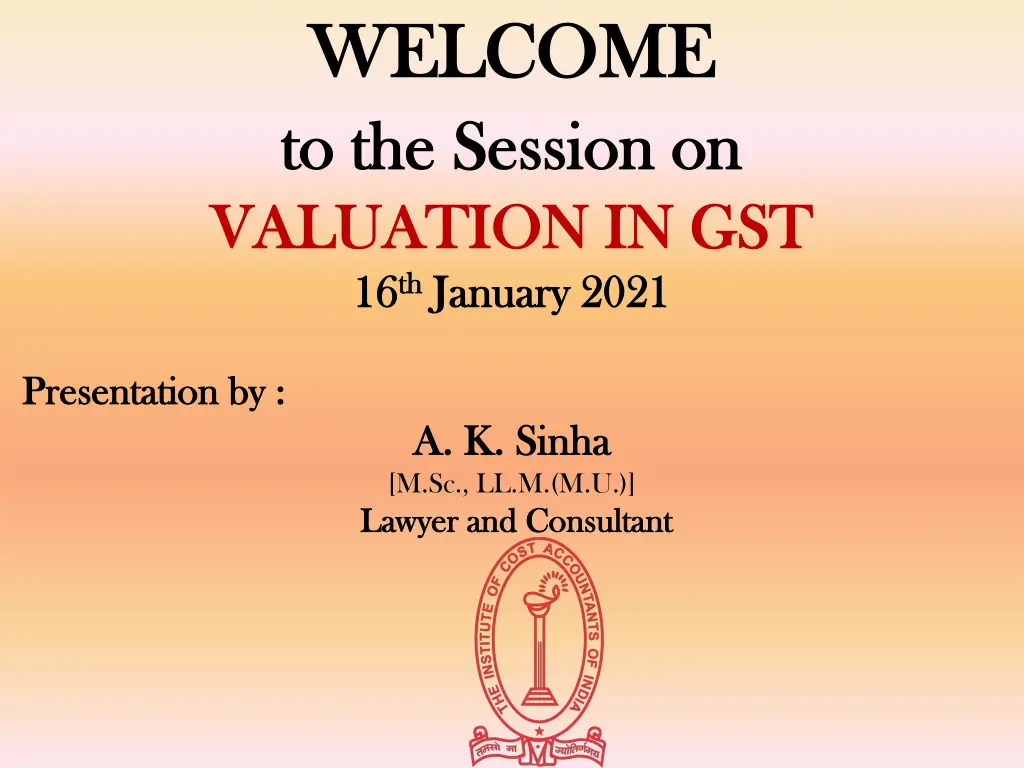
Valuation in GST - Understanding Section 15 and Rules
Explore the valuation process in GST through Section 15 of CGST Act, 2017 and Rules 27 to 35 in detail. Learn about the factors affecting the value of taxable supplies, including non-monetary considerations and related party transactions. Gain insights on the inclusions in the transaction value, such as taxes, expenses, discounts, and more.
Download Presentation

Please find below an Image/Link to download the presentation.
The content on the website is provided AS IS for your information and personal use only. It may not be sold, licensed, or shared on other websites without obtaining consent from the author. If you encounter any issues during the download, it is possible that the publisher has removed the file from their server.
You are allowed to download the files provided on this website for personal or commercial use, subject to the condition that they are used lawfully. All files are the property of their respective owners.
The content on the website is provided AS IS for your information and personal use only. It may not be sold, licensed, or shared on other websites without obtaining consent from the author.
E N D
Presentation Transcript
WELCOME WELCOME to the Session on to the Session on VALUATION IN GST VALUATION IN GST 16 16th th January 2021 January 2021 Presentation by Presentation by : : A A. K. . K. Sinha [M.Sc., LL.M.(M.U.)] Lawyer and Lawyer and Consultant Sinha Consultant
VALUE OF SUPPLY Section -15 of CGST Act, 2017 Rule- 27 to 35 of CGST Rules, 2017 [Ch IV]
VALUATION of Taxable Supply S.15 (for goods & services both) S.15(1) : GST payable on Transaction Value , which is price actually paid/payable, where supplier and the recipient are not related; and the price is the Sole Consideration Otherwise- As per Rules 27 to 35 [CGST Rules 2017, Ch-IV ] Valuation Rules Resorted to when- i. Flow of non-monetary extra consideration ii. Parties are related (price influenced) iii. Doubtful transaction value iv. Business transaction by specific suppliers. [Non- monetary; RD;PA; Lottery/betting; MLAVUP]
TV Includes- Taxes other than GST T E L I S D Expenditure by recipient Late fee/interest Incidental expenses Subsidies (non-Govt) Discounts allowed after supply
Inclusions- [S.15(2)] (a) duty/tax/cess/fee charged under other laws [BCD on import; C.Ex. Duty on manufactured tobacco; property tax charge on rent bill; local body entertainment tax on cinema ticket] (b) Suppliers liability incurred by recipient, and not included in the price. [freight paid by recipient in FOR contract; selling commission paid by recipient (not buying commission paid on his own account. But does not cover free inputs/services supplied by recipient, which is not the liability of supplier)] [As per second proviso to R-37(1) inserted wef 13.6.18, such amt will be deemed to have been paid to supplier, so that recipient need not reverse proportionate credit u/s16(2)] (c) Incidental expenses incurred before supply- (including packing, commission) and any amt charged for anything done by the supplier in relation to the supply charged/paid at/before supply. [packing, commission, testing, installation, design charges, fumigation charges if billed to the recipient] Note- Outward freight charged is part of value, and same rate as on goods will apply as the FOR contract is a composite contract. Showing / charging it separately at 5% in the invoice is not correct as the supplier is not a GTA.
Inclusions- [S.15(2)] (d) Late fee/interest/penalty for delayed payment of consideration. [goods valued 1 lakh sold on one-month credit, failing which 18% annual i.e 1.5% monthly interest. Payment received after two months. Taxable value will be 1 lakh + 1500/-. However will not be added if it is waived by supplier]. Note- one view is that normal interest should not be exigible to GST as it is within agreed terms and is also an exempted supply. Delayed refer to delay beyond agreed terms; and the meaning of interest should be gathered from its associate words. (d) Non-govt i.e. private subsidy directly linked to price (includible in the value of subsidy receiver). [(1)Geometry box of Rs 75 sold at Rs 25 to Govt-School- students. Rest Rs 50/- given by a company from its CSR fund as subsidy. GST payable on Rs 75/-. The same subsidy, if given by Govt, GST will be paid on Rs 25 only. (2) Lion s club gives subsidy to Pvt Management College for poor students reducing their fee from 4 lakh to 1 lakh. Taxable value is 4 lakh.] Ponny Sugar (Erode) Ltd v. DCTO (2005 SC) held that transport charges (subsidy) incurred by sugar mill owner for bringing sugar cane to mill are includible in taxable turnover. Neyveli Lignite V. CTO (2001 SC) followed in EID Parry Vs ACCT (2002 SC) held that subsidy received from GOI uder Fertilizer (Control) Order is not part of taxable turnover, and is de hors the contract of sale with buyer. Note- Govt subsidy is not a consideration as per S.2(31).
Exclusions [S.15(3)] (a) Invoice recorded Pre/at supply discounts. [Company gives to distributor 40% discount on list price. GST payable only on 60% value.] (b) Invoice linked post-supply discounts established by contract before/at supply [if proportionate credit attributable to the discount is reversed by recipient]. [Orient Fan Ltd is selling fans (MRP 10000/-) exclusively through its distributors across India. It sells the fans to the distributor at Rs 7000/- per fan. The company dispatches stock to its distributors for every quarter. The company has a declared policy to offer a discount of 10% per fan in a particular quarter, if in the preceding quarter the distributor sells more than 500 fans. The company appoints a Distributor on 1st April and dispatches 750 fans on 8th April for the quarter-1 (April to June) at Rs 7000/- per fan. The distributor places purchase order for 1000 fans for next quarter-2 (July to Sept), which is dispatched by the Orient company on 10th June (i.e. 20 days ahead of the quarter-1 end) at Rs.7000/- per fan. By 30th June (end of quarter-1) the distributor succeeds to sell 550 fans, and therefore, as per the company s declared policy, becomes entitled for 10 % discount on the stock (of 1000 fans at Rs 7000/- per fan) of next quarter, which is already supplied to him on 10th June. Thus taxable value = 1000 x (7000- 700) = Post-supply discount not known at the time of supply can not be reduced from value- [Apart from list price standard discount (which is reducible from value), the Shoe company gives incentive discount to dealers to push their unsold stock] UltraTech Cement Ltd (2018 AAR Mah) Post supply ad hoc discounts not eligible. Maya Appliances Pvt Ltd Vs ACCT (2018) SC All regular trade discounts allowed. They may be strategically not disclosable.
Types of Discounts: 1. Special discount or rebate:- It is contingent upon the future purchase. Not allowed if not established according to any agreement. 2. Bonus discount:- To those who purchase more than the stipulated number. Not decided a the time of supply, rather negotiated subsequently. 3. Incentive / commission:- generally accounted for in the financials as discount. Will not be considered in GST as discount, as it is given in the form of incentive without reducing the sale price. 4. Remission:- The reduction allowed from the sale price to the purchaser, to compensate him for the general fall in prices. It will not be a discount being post supply and not being part of any agreement. 5. Compensation:- In the form of rate difference or trade discount. E.g. a dealer has to sell 500 tyres to final customer at Rs 900/- against the original purchase price of Rs. 1000. The difference of Rs. 100/- is to be compensated to the dealer by the manufacturer.
S.15- defines and prescribes Transaction Value. Specifies inclusions and exclusions thereof [TELISD] . Refers to Valuation Rules 27 to 35 in deserving cases; also enables to notify valuation method. (eg. 2/3rd presumptive value for builders) R-27- when consideration is not wholly in money [OKLD] R-28- Supply between related (expln to S.15) or Distinct (S.25) persons. [OLD] [If to be further supplied as such, then option of 90% of recipient s sale price of like goods. If full ITC available to recipient, then value declared on invoice is deemed to be omv] GKB Lens (P) Ltd AAR WB 30.5.18:- Applicant who is reseller and importer of Sunglasses, frames, lenses etc sending from his west Bengal head office to his branches across India can chose 2nd proviso over the 1st, and can thus value the suppies on the costprice instead of 90% of MRP. 2nd proviso applies on both situations i.e. when further removed as such and when full ITC on invoice is available to the recipient. Circular 47/21/2018-GST dt 8.6.18:- Moulds / dies sent by OEM (original equipment manufacturer) to job worker free of cost does not constitute a supply as they are not distinct or related persons. The OEM need not reverse the ITC on it. Also, the job worker will not include cost of mould / dies in the value of components manufactured as it is not his cost. However, if as per the contract, job worker was required to make the components using his own dies and then the OEM supplies such moulds free of cost, then the OEM will reverse the ITC as the clearance of moulds by him will not be in the course of furtherance of his business. Also the job worker will include amortized cost of the moulds n the value of the equipments manufactured by him for the OEM.
R-29- Supply between Principal & Agent. [O/D] [ie either omv or agents intended selling price] R-30, 31- Cost Construction (110% COP) & Best Judgment (consistent with principles & provisions of s.15 and the valuation rules) methods of determining Transaction Value. [for services, computed method can be ignored] R-31A- Lottery [100/112 or 100/128 of FV of ticket, or its notified price, whichever higher, for State run and State authorized lottery respectively. However now wef 1.3.20, rate on all lottery is 28% u/RCM (u/any chapter) and so Value=100/128 of FV or its notified price, whichever higher. Lottery service falls under 999694, but considered as goods in GST. No provision in GST for unsold lottery tickets.], Betting, Gambling, Horse racing [100% bet value or amt paid into the totalisator] R-32, 33- Special manner of valuation for specific cases (at supplier s option). [MLAVUP- Money changer(2); Life insurance(4); Air-travel agent(3); Voucher(6); Used goods(5); Pure agent(R-33)] R-34- Exchange rate in FC transactions. [CBEC notified u/Cus Act] R-35- Tax amt when value is cum-duty-price [tax% / (100+tax%) X cum-duty price] Note- the rule applies only if the value does include GST; it does not say that value is deemed to be inclusive of GST. Thus, in case of RCM the amt charged by supplier cannot be taken as inclusive of GST. The applicability of the contrary view in Maruti Udyog 2002 ruling and the pursuant Circular 803/36/2004-CX dt 27.12.2004 in GST regime needs to be examined.
Example for Rule 27:- [taken from the book authored by Dr Bangar] Mr S supplied goods X to Mr. R for consideration of Rs. 5,00,000 (excluding taxes). Mr R also gave some material to Mr. S as consideration for such supply whose value was Rs 20,000/- (excluding taxes). Mr. S has supplied the same goods to another person at price of Rs 5,71,200/- (including GST @ 12%. (a)Determine the value of supply. (b) what if price of Rs 5,71,200/- is not available (c) what if OMV is also not available, but at the time of supply of goods by Mr S, identical goods have been supplied at value of Rs 5,25,000/- (excluding taxes). Ans:- (a) 1st option is OMV (i.e. another arm s length transaction of Mr. S) will be value of supply. i.e. 5,71,200 X 12/112 = 5,10,000. (b) If OMV not available, 2nd option is known money equivalent . Thus, 5,00,000 + 20,000/- is value of supply. (c) In case money value of extra-consideration also is not available, then 3rd option is like of comparable supply i.e. arm s length transaction of some other person. Thus, 5,25,000/- is the value of supply.
Example for Rule 29:- [taken from the book authored by Dr Bangar] Value of supply in case of supply through agents:- Home Appliances Ltd (Faridabad) has 15 agents across the State of Haryana (except Faridabad). The stock of vacuum cleaners is dispatched on Just-In-Time basis from Home Appliances ltd. to the locations of the agents, based on receipt of orders from various dealers, on a fortnightly basis. Home Appliances Ltd is also engaged in the wholesale supply of vacuum cleaners in Faridabad. An agent places an order for dispatch of 20 vacuum cleaners on 10.12.17. Home Appliances Ltd. had sold 20 vaccum cleaners to a retailer in Faridabad on 8.12.2017 for Rs. 1,30,000. The agent effects the sale of the 20 units to a dealer who would effect the sales on MRP basis (i.e., @Rs 7000/unit). Ans. Either the open market value, or 90% of the price charged by the recipient of the intended supply to its customers, at the option of the supplier. Thus, the value of the supply by the Home Appliances Ltd to its agent would be either Rs1,30,000 or Rs1,26,000 (i.e. 90% x 7000 x 20), based on the option chosen by Home Appliances Ltd.
Open Market Value means the full money value (excluding GST/CC) to obtain such supply at the same time in arm s length transaction. This is the arm s length price. It is not comparable price ie price in another comparable supply at a close proximity in time. This provision does not provide the manner of adjustments to be made to overcome the effect of those disqualifying circumstances present but simply states that OMV shall be the value of supply. [as per Explanation (a) to Rule 35] [i.e. Full money value (-) GST for proximate arm s length supply] supply of G/S of like kind and quality means any other G/S supply under similar circumstances (i/r/o the characteristics, quantity, quality, functional components, materials, and reputation of the G/S is the same or closely / substantially resembling).
Warranty replacement of parts:- involves Free supply of goods (parts) by company (OEM) to end customer, though through the dealer. Here, though the dealer delivers the goods to customer, but actually he supplies service to the company. Accordingly, no GST on such free replacement (as it is FOC supply to non-related person. Moreover, cost of replaced part is already included in original supply of machine or so) & GST on service value charged by the dealer to the company. [also, FAQ dt 19.8.17:- No ITC reversal for warranty replacements. Physician samples given by company to doctors through sales representatives:- involves two supplies one by doctor to patient (which is exempt); and another by company to doctor which is FOC supply to non-related person, and hence no GST (however ITC reversible). [even if it is established that there is additional consideration flowing from doctor to the company ?]
Complications because of businessassets & gift not defined Disposal of credit availed old machinery (laptop) to NGO- [the machine being business asset, becomes a supply as per para 1 of Sch II.] Disposal of old machinery to distinct person- [It also becomes a supply under para 2/Sch II, when given to own branch in other state.] Note- in case of such disposal by way of gift, free sample, the ITC becomes reversible u/S17(5)(h) Free samples- ITC becomes reversible u/S17(5)(h). But will it not be free transfer of business asset, and then exigible to GST? Gift of own finished goods or market purchased goods given to distributors to incentivize them- eg chemical company gives scooty to its distributor. Whether GST payable u/para 1 Sch II treating it as ITC availed business assets? Or ITC reversal treating it as disposal by way of Gift u/s17(5)(h)? Thus, if the taxpayer avails the input tax credit on account of a purchase of goods, and later gives these goods as free samples, then he will have to reverse the input tax credit so availed. Gifts for Marketing- Buy one get one free (a form of discount)- [value should not be included as per S.15(3), also no ITC reversal should be required]
Free goods given along with sale- Sectoral FAQ says that Invoice Value would include value of all goods including those supplied free. In such cases, ITC is not required to be reversed Free samples distributed by Pharmaceuticals, Cosmetics, Food Products etc. to customers/branches across the country:- No GST, but ITC reversible. Clearance of physician samples- Sectoral FAQ says that ITC availed on such samples will be reversed u/s17(5)(h). No GST payable as value of supply is zero and no ITC is availed. Distribution of Samples through branches:- transferor branch will pay GST on samples and will not reverse any credit while transfering to inter-state branch. However, the transferee branch will reverse the ITC of tax paid on such samples, when he distributes the samples to the customers. Free supplies made by recipient and amortized cost of patterns, tools, dies etc are not includible in value for GST. As per CBIC circular no. 47/21/2018 - GST dt 8.6.18 the principal (OEM) who supplies tools, moulds etc free of charge will not reverse credit; and the component manufacturer will not include the cost of such items in the value of components supplied by him to the principal manufacturer. But as per the contract, if component manufacturer was liable to make tools/moulds then OEM will reverse ITC and Component manufacturer will include the amortised cost in the value of components.
Bhayana Builders Pvt. Ltd (2018)- Supreme Court- Freebies provided by recipient not includible:- Held that value of goods and materials supplied free of cost by a recipient to supplier is neither monetary nor non-monetary consideration paid by or flowing from service recipient, accruing to benefit of provider. Hence, the value of such / material is not to be included in price charged for them by the supplier. Returnable containers- value not includible in the value of supply. Fringe Benefits:- [Press release 28.8.17]- Fringe benefits are transactions in furtherance of business. These are non monetary i.e. G/S supply from employer to employee (related person). Therefore, even if supplied without consideration, the same are deemed supply of Sch I and will attract GST.
AAR Karnataka : Cross charge expenses are liable to GST: Salary for services like accounting, IT, human resource provided by the head office of a company to its branch offices in other states will attract 18% GST. Only that part of service provided by employees at the corporate office to the corporate office will come under employee-employer relationship, and not the services provided by such employees to branch offices in other states. The corporate office and its inter state branch units are distinct persons. Further, the valuation should include all costs. The employee cost also needs to be taken into consideration. In cases where G/S supplied by branches are fully or partially exempt from GST (eg hospital, school, petroleum, liquor, the HO will be paying GST but no ITC will be available to recipient branch. Note- Cross charge expenses are charged at cost without any mark up. What valuation will be accepted?
AAR Karnataka : Mere deposit of diamonds with safe vaults acknowledged by electronic vault receipt does not constitute a supply. Since no consideration is involved, no supply. Derivative contract in e-units would constitute as security and accordingly any transaction in them shall be out of the scope of GST. Note- The ruling reinforces the principle that consideration is a sin-qua-non for GST liability. Thus, rightly held that mere deposit of goods to a custodian without consideration for keeping such deposit is not liable to GST.
CBIC Circular 47/21/2018-GST dt 8.6.18- Free supplies made by Principal (OEM) to component manufacturere and amortized cost of patterns, tools, dies etc are not includible in value of components, unless it is the contractual liability of the component manufacturer. Also, ITC not to be reversed by OEM. New insertion second proviso to Rule 37(1) wef 13.6.18- amt of supplier s liability paid by the recipient on behalf of supplier will be deemed to have been paid to supplier, so that recipient need not reverse proportionate credit u/s16(2)] Circular 112/19 dt 3.10.19 withdrew Circular 105/19 dt 28.6.19 which clarified on post sale discounts and secondary discounts. Circular 92/11/2019-GST dt 7.3.19:- Promotional Items:- ITC of input / CG / services not available to the extent they are used in relation to the gifts or free samples distributed without consideration. However, where gifts / free samples fall within the scope of supply as per Sch I, the supplier would be eligible to avail ITC. FAQ dt 19.8.17:- No ITC reversal for warranty replacements. Circular no 102/21/2019-GST dated 28th June 2019 has released a clarification on the matter of penal interest, nullifying the ruling of AAR in case of Bajaj Finance Limited. . [drawn clear distinction between the implication of GST on interest including penal interest charged by a supplier of goods and services where the supplier has extended a credit facility to the buyer and the implication of GST on interest collected by a finance Company where the principal supply is supply of services of extending loan or deposit.
Circular 48/22/2018-GST dt 14.6.18 (1) Moulds / dies sent by OEM (original equipment manufacturer) to job worker free of cost does not constitute a supply, as they are not distinct or related persons. Also, cost of dies/moulds will also not be included in the job worker s supply value (job charges), as it is not his cost. However, if as per the contract, job worker was required to make the components using his own dies/moulds, and then if OEM supplies such moulds free of cost then it is service provider s liability incurred by the recipient (i.e. OEM); and accordingly, amortized value of mould will be included in job charges. Also, the Principal (i.e. OEM who sent free mould to JW) will reverse the credit taken on the mould, as the clearance of such mould by him (which was not his liability) will not be in the course or furtherance of his business. (2) Car servicing involving supply of goods:- case to case basis; on the particular facts. If value of goods and services supplied are shown separately on invoice, separate rates as goods and services will apply.
Penal Interest on EMI Default:- Circular no 102/21/2019- GST dt 28.6.2019 GST on additional / penal interest on delayed charges in case of late payment of EMI (Equated monthly instalment):- It does not fall within para 5(e) of Sch-II (i.e. it is not tolerating act / situation) It is additional value of the original supply i.e. extending deposit, lone or advances , the consideration of which is in the form of interest and so exempted under sr. number 27 of N/N 12/2017 CTR dt 28.6.2017 (other than interest involved in credit card service) The financial institution levying the interest and penal or additional interest would not be liable to tax, which is not the case when supplier of goods is charging the same.
Illustrations given in Circular no 102/21/2019-GST dt 28.6.2019 on penal interest:- CASE 1: AMC Mart sells refrigerator to the customer XYZ having price INR 40,000/-. Further AMC Mart provides an option to XYZ to pay the amount for refrigerator under an instalment of INR 10000/- monthly over a period of 5 months. Further if XYZ make default in payment of instalment of loan then in such case an additional amount of penal charges amounting to INR 500/- pm shall also be collected from XYZ. Further AMC Mart will raise a separate invoice for recovery of interest amount as embedded in monthly instalments as well as for the amount of penal interest. As per the provisions of sub-clause (d) of sub-section (2) of section 15 of the CGST Act, the amount of penal interest is to be included in the value of supply. The transaction between AMC Mart and XYZ is for supply of taxable goods i.e. Refrigerator. Accordingly, the original amount of interest as well as penal interest would be taxable as it would be included in the value of the Refrigerator, irrespective of the manner of invoicing. CASE 2: If in the above case refrigerator is being sold by AMC Mart and XYZ has the option to avail the loan from AZB financers. XYZ shall repay the amount of loan in 5 monthly instalments of INR 5000 each. Further an additional amount of INR 500 as penal interest will be recovered from XYZ in case there is default in payment of due instalments. The additional / penal interest is charged for a transaction between XYZ and M/s AZB financers and the same is getting covered under Sl. No. 27 of notification No. 12/2017-Central Tax (Rate) dated 28.06.2017. Accordingly, in this case the penalinterest charged thereon on a transaction between XYZ and M/s AZB financers would not be subject to GST, as the same would be covered under notification No. 12/2017-Central Tax (Rate) dated 28.06.2017. The value of supply of refrigerator by AMC Mart to XYZ would be INR. 40,000/- for the purpose of levy of GST. It is also important to note that if AZB financers also collects some charges or fee form XYZ then such charges or fee for extending loan or deposit shall not be considered as interest under as defined in notification No. 12/2017- Central Tax (Rate) dated 28.06.2017, and accordingly will not be exempt.
Rules 27 Additional consideration >OMV, >Money + known money equivalent; >like supply, >Money + determined money equivalent (by R-30/31). [OKLD] 28 Between non-agent R - D >OMV (inv value is deemed omv if full credit admissible); 90% of recipient s arm length selling price (if further sale as such); >like supply, >Money + determined money equivalent (by R-30/31). [I90LD] 29 Between P A >OMV or 90% of the agent s arm length sale price of like goods; >Determined value by R-30/31 ie. Computed/Residuary [I/90LD] 30 Computed method 110% of COP/COM/COA 31 Residuary method >Using reasonable means consistent with accounting principles and GST valuation provisions. >service supplier may choose residuary skipping the computed method 32, 33 Overriding provision for - [MLAVUP] - money changer; Life insurance; Air travel agent; voucher; used goods; pure agent.
Rules (i) sale/purchase of Foreign currency including money changing OPTION 1- Margin option (a) FC INR ie Rupee conversion >[Difference of bying/selling rate & RBI reference rate] X number of units exchanged. >If RBI reference rate not available, then 1% of gross INR value of transaction Rule-32(2) (b) FC FC, ie Non-rupee conversion >1% of lesser of rupee equivalents of FCs OPTION-2- fixed amount option >INR 250 or 1% of gross currency exchanged utpo INR 1 lakh >INR 1000 + 0.5% of gross currency exchanged upto Rs 10 lakh after that. >INR 60,000 or (INT 5500 + 0.1% of gross currency exchanged aftere10 lakh) lower of the two.
5% of Basic Fare (Domestic) 10% of Basic Fare (International) Air travel agent Life insurance Rule 32(4) (ii) Gross premium charged from a policy holder (-) Amt allocated for investment / savings on his behalf, if intimated to him at the time of supply of service. (iii) 10% of Single premium charged from the policy holder (for single premium annuity policies other than above) In all other cases:- (25% of premium charged in Year 1) + (12.5% of premium charged in subsequent years)
[selling price purchase price] ie margin scheme Negative difference will be ignored. Used goods Rule 32(5) (iv) Full supply value, if purchased from RD and credit availed. Purchase value when goods Repossessed for Debt-recovery from defaulting borrower If the defaulting borrower is URD- then purchase value will be [Purchase price in the hands of such borrower (-) depreciation from the date of purchase and the date of disposal by the person making such repossession]
(v) [money value of G/S redeemable against such voucher etc ] Voucher, coupon etc. Rule 32(6) 33 Cost / expenditure made by supplier as pure agent of recipient will be excluded from the value of supply Conditions for qualifying as pure agent- Contractual arrangement to act as pure agent Not holding/ intending to hold any titile to G/S procured as pure agent. Recovers only actual amount incurred. Pure agent Rule 33 Conditions for exclusion from supply value- Provider paid to third party on authorization Expenses are separately shown in invoice Supplies procured as pure agent are in addition to the supply of provider on his own account
34 Exchange of FC CBEC notified exchange rate for that currency at TOS. 35 Tax inclusive value Rule 35 Value determinable by back calculation. 2 Expalantions -OMV means full money value (excluding GST/Cess) in a transaction between non related parties with consideration. price as sole -Like supply means made under similar circumstances i/r/o characteristics, quality, quantity, functional components, materials and the reputation of the goods and/or services.
a. b. c. d. e. Pure agent Money changer Insurer Air travel agent Buyer / seller of second hand goods
Valuation Rules 27 to 35 Rule 27- Value of supply of G/S where consideration is not wholly in money- open market value. If not available, add money equivalent of the additional consideration. Rule 28- Value of G/S supply between related and distinct persons: Open market value If not available, take value of like kind and quality If not determinable by these, then computed method & Residuary method sequentially.
Rule 29- Value of supply of goods made or received through an agent- Open market value or, at the instance of supplier, 90% of value of like kind/quality that the agent charges to his customers. If not determinable, then resort to computed and residuary method. Rule 30- Value based on Cost (Computed method)- 110% of Cost of production/acquisition/service provision.
Rule 31- Residuary method (Best judgment method)- Using reasonable means consistent with principles and general provisions for valuation u/s 15, and Rules. Note- Service supplier may opt for best judgment method disregarding the computed method.
Rule 32- Valuation of certain Specific Supplies: 1. Sale / purchase of foreign currency including money changing- If conversion to / from INR [exchange rate RBI reference rate] X total units of currency] 1% of gross amount of Indian rupees provided or received by the money changer. If RBI reference rate not available, then Optional Composition Scheme:- Alternatively, changer may opt for the whole year as below:- Gross amt of currency exchanged Up to 1 lakh (minimum 250/-) 1 to 10 lakh Above 10 lakh Value of supply 1% Rs.1000 + 0.5% Rs. 5500 + 0.1%
Air ticket booking (Composition Scheme) 5% of basic fare (in case of domestic booking) 10% of basic fare (in case of international booking) Life Insurance Service supply (Composition Scheme) [Gross premium amt allocated for investment/savings] In case of single premium annuity policies > 10% of premium charged. In all other cases > 25% of premium charged If entire premium is only for risk cover > 100%
Buying / selling second hand goods : MARGIN SCHEME Margin Scheme [if resold as such + no ITC availed on purchase] i.e. [selling price purchase price] If this comes negative > will be ignored. Press release dt 15.7.17 says- margin scheme applies on all taxable persons dealing in second hand goods, including old and used empty bottles. Demerit of Margin Scheme- purchase price of second hand goods dealer gets revealed to his buyer, which he would never like to. No RCM on purchase of old goods from URD [Notfn 10/17 CTR 28.6.17] Press release 78/2017 dt 13.7.17 expresses similar view for situation when an individual sales old jewellery to the registered jeweller. Tax rate reduced w.e.f. 25.1.18 for margin Scheme:- Notfn 8/18 CTR 25.1.18 & 1/17 CC dt 28.6.17 (amended on 25.1.18) as :- [if no ITC was availed] 18 % IGST + no cess on used and old vehicles with specified capacity and size 12% IGST + no cess on used and old vehicles of other categories. Same rate applies where the old used vehicle was the part of business assets of the person. Then, the margin will be the consideration received for supply of old used vehicle and its depreciated value.
Voucher/coupon/token redeemable against G/S supply [money value of G/S redeemable against voucher etc ] Supplier as a Pure Agent of recipient- Cost / expenditure made by supplier as pure agent of recipient will be excluded from the value of supply. Eg. i. Outward transport charges paid on behalf of recipient. ii. Entry tax amount paid by C&F Agent, Customs Brokers or Transporter on behalf of owner of goods or Principal. iii. Customs duty, dock dues, demurrage, transport charges etc paid by Customs broker on behalf of client. iv. Special inspection arrangement as per specific requirement of recipient. v. Advertisement charges paid by advertising agency to newspaper on behalf of clients. vi. Ticket charges paid by Travel Agent to railways or airlines and recovered from his customer. Conditions are:- a) The supplier acts as a pure agent of the recipient of the supply, when he makes payment to the third party on authorization by such recipient. b) The payment made by supplier on behalf of recipient has been separately indicated in the invoice issued by the supplier to the recipient. c) The supplies procured by the pure agent from third party are in addition to the services supplied by him.
AAR (Maharashtra) in Zaver Shankarlal Bhanusali 2018 GST is applicable on the compensation for alternate accommodation to be paid to the tenant of the old building by the developer / owner in the event of delay in handing over possession of the new premises.
Reasonable nexus between measure and nature of levy of tax is sufficient, direct relation not required. [CCE Vs Grasim Industries Ltd (2018)] Value does not include TCS under income tax. S.15(2)(b) does not cover free inputs given by recipient, as it speaks only about amount paid by recipient on behalf of supplier. Development charges like design and tooling are includible in value. GST should not be leviable on normal interest as per agreed terms. What S.15(2(d) says to include in value is interest, late fee or penalty for delayed payment . The term delayed means delay beyond agreed terms. Penal interest on EMI delay is additional value for main supply, and is not consideration for separate transaction of tolerating the act/situation covered under 5(e)/Sch II.
If seller himself grants EMI instalments, the penal interest is part of the value. But, when loan is given by Finance Company directly to the buyer, the penal interest is exempt supply. [Some AAR held that Penal interest (or LD charges) is the consideration for tolerating an act or situation and is a separate service]. If demand is raised for past period when no GST was charged on invoice, then the amount charged should be taken as inclusive of GST. [issue settled by SC in pre-GST regime, and quoted with approval in CBEC circular 803/36/2004-CX dt 27.12.2004]. However, ITC will not be available if invoice is beyond one year. In FOR contract supplier procures GTA service and pays GST in RCM. Subsequently he should include such freight (also packing, weighment etc) into the value of goods and pay GST at the rate of goods, as it becomes composite supply. If goods are attracting GST at different rates, then fright will have to be loaded proportionately (as no clarification provided). It is incorrect to charge freight separately and charge GST @ 5%.
General subsidy, and Govt subsidy is not part of value, but directly price linked private subsidy is part of value. Subsidy (transport charges from field to sugar Mill) received by cane growers from purchaser (sugar mill owner) is includible in the taxable value. Planting subsidy by miller to can-growers, and transport subsidy to transporters to ensure scheduled delivery is component of selling price. Post supply discount is permissible as deduction only if it was known at / before the Time of supply. Ad hoc discount given after supply is not eligible for deduction from value. For giving post supply discount, if supplier issues credit note without GST (i.e. financial / commercial credit note), then recipient need not reverse any credit. If supplier does not issue credit note, the recipient should issue debit note; otherwise his credit may be hit by 2nd proviso of S.16(2) r/wRule 37 i.e. credit reversible if vendor not paid within 180 days.
Issue of credit note means payment received by supplier. Since it reduces the liability itself, the 2nd proviso to S.16(2) does not trigger. No provision for adjustment of GST on bad debts. Supplier can reduce from value Pre-agreed invoice linked post supply discount i.e. secondary discount) if recipient reverses the credit [S.15(3)(b)]. Eg. Staggered quantity discount under buy more save more scheme, and post supply volume discount. Supplier need not reverse any credit proportionate to such discounts. [effect of modified S.34(1) i.e. consolidated credit note for multiple invoices has not been given at S.15(3)(b)(i)] For reducing post supply discount from value, the three requirements are- (i) pre/at supply agreement (ii) specific linkage with invoice, & (iii) ITC reversal by recipient. In buy one get one free or one item free offers, really it is not free supply . It is supply of two for the price of one . Rate of GST will depend on whether it is composite or mixed supply. [Cir 92/11/19 dt 7.3.19]
Cir 105/24/19 dt 28.6.19 [an impracticable circular; therefore, withdrawn later] said:- (i) if the dealer (recipient) has not to do anything in return, then the discount is in respect of the manufacturer s original invoice; (ii) but if dealer has to do sales promotion, advertisement, exhibition etc then these services are outward supply of the dealer to the manufacturer, and the discount is its consideration; (iii) if discount is given by manufacturer so that the dealer can sell the goods at reduced price, then the discount is part/additional consideration for dealer s invoice to customers. But customer will get credit only i/r/o part consideration paid by him.
Quantity discount (eg 11 pieces supplied for price of 10. additional quantity of medicine given to stockiest for higher take off) given by way of additional supply against the same consideration is permissible. Such extra quantity will not be exigible to GST. It has the sake effect as money discount as in both cases there is reduction in price charged to customer. Free supplies made by recipient and amortized cost of patterns, tools, dies etc. are not includible in value for GST. This view is correct because GST is on supply and not on goods or services as such. Thus, only what is supplied should be added to value. If added to value, it will be against ITC principle in as much as cost of such freebees are added to the value of job-worker while the credit thereon is availed by the Principal (or OEM). Transaction value acceptable even if supply is below cost (provided there is no additional consideration).
Charity (Dharmda) collected separately in invoice is not includible in value, as it is voluntary on purchasers, and it was not taken as income of the assessee. Value of GTA service should include diesel supplied free by customer, as the concessional rate of 5% on GTA service is fixed considering the cost of diesel involved. (otherwise, GST should normally apply only on what is supplied). Donation would be taxable if donor is receiving identifiable benefits in terms of advertisement or publicity. Price to related person acceptable if the recipient is eligible for entire ITC. [second proviso to Rule 28]. Invoice should declare some value, not nil; otherwise ITC will not be available. [will not apply on centralized kitchen supplying semi-cooked food to inter- state distinct restaurant (because restaurant can not take ITC)] Price to related person acceptable if it is same as charged to others.



